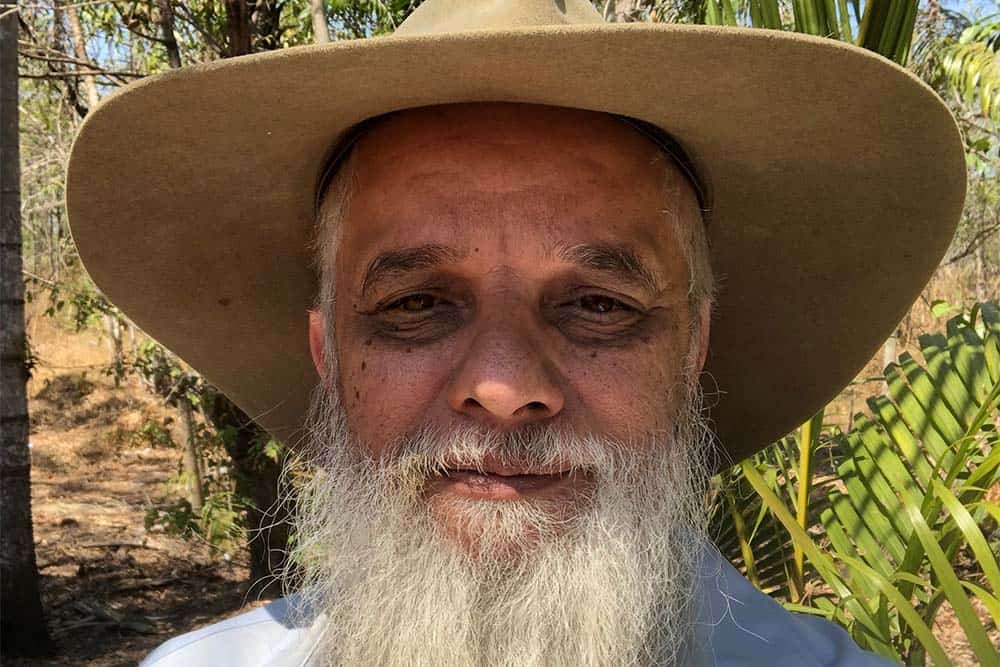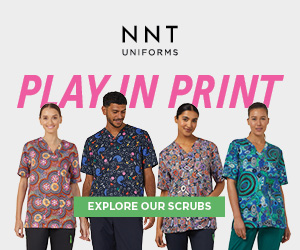Healthcare is just one piece of the puzzle, explains nurse Ted Murphy.
For example, listening to patients and engaging them in their own care has the power to lift experiences and develop mutual learning.
“I recall working with an old man who had returned to country to die,” Ted says.
“He had decided it was his time. There was little by way of a remote palliative care service at that time and we had to wing it for the most part. One of the greatest privileges I’ve experienced was this old man teaching me what was needed for the ‘proper’ way for him to die on his country, surrounded by family.”
Ted is a Jinaburra man hailing from Dahmongah, north of Brisbane, and despite living in the Northern Territory since 1997, it’s still the area he feels most connected to and calls home.
In his early days in Queensland, Ted worked as a motor mechanic and landscape gardener before finding nursing.
“I enjoy helping people,” he says of the career shift.
“I find it very difficult to ignore those in obvious need who seek help.”
Ted undertook his grad year at the Redcliff e Hospital and stayed on to work in intensive care.
The memory of his first day as a fully-fledged RN remains strong.
“The sudden realisation that I was responsible for eight or so patients was both sobering and terrifying. Fortunately, my more experienced colleagues made allowances for this and took great care to see that I was supported where necessary and allowed to “fly solo” when appropriate.”
Over the next two decades, Ted’s career trajectory saw him move to the NT and work across the health system as a nurse, educator and manager.
His posts have included working in the prison system, remote area nursing, lecturing students, nursing at the Royal Darwin Hospital and strategic responsibilities with the Northern Territory Department of Health.
He describes nursing as confronting on some days, a vocation rather than a job, and always rewarding.
“It’s a privilege to be able to help in those moments of fear, joy and dire need that others experience.”
As an Aboriginal and Torres Strait Islander nurse leader, Ted believes improving access to healthcare and outcomes for his people rests with policymakers needing to listen to those at the coalface.
His current role is Director of Nursing and Midwifery Education and Research (Informatics) at the NT Government, providing specialist advice on primary healthcare matters to the Northern Territory Core Clinical Systems Renewal Program.
“Aboriginal issues need Aboriginal solutions,” he says.
Ted acknowledges racism remains a significant issue and is visible in many forms, particularly the disparity in access to healthcare.
“Is there racism in healthcare? Absolutely. But it’s not obvious. For example, if you need a kidney transplant and you’re Aboriginal and live in a rural or remote area, your chances of going onto a transplant list is much less than that of a non-Indigenous candidate living in a major metropolitan area.”
A board member and the NT Director of CATSINaM, Ted says the organisation’s mission to increase the Aboriginal and Torres Strait Islander nursing and midwifery workforce in order to achieve health equality remains at the forefront.
“We now have a voice at a national level and a burgeoning acknowledgement of the legitimacy of Indigenous knowledge in mainstream arenas. Because of CATSINaM, we no longer have to ‘leave our culture at the door’.”
As a role model, Ted’s advice to the next generation striving to make a difference to their communities acknowledges a long road ahead.
“We’re over-represented as clients in prisons and in hospitals and clinics, yet under-represented in professional caregiver roles,” he says.
“I’m confident that having a proportionate number of nurses and midwives to work with our own mob, we can meet that challenge.
“[Remember] you are Aboriginal and/or Torres Strait Islander first, a nurse or midwife second. Act with probity, honesty and cultural integrity. While much has been done, the job isn’t finished.”









One Response
Well done Ted
Elizabeth Davies.